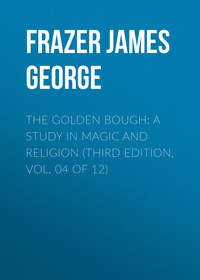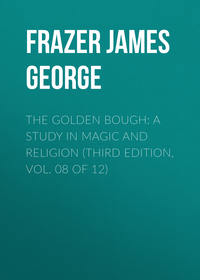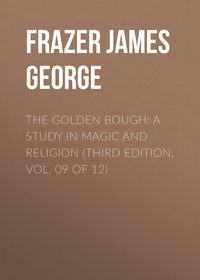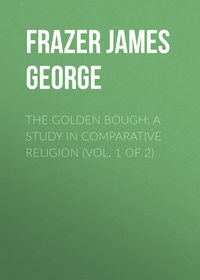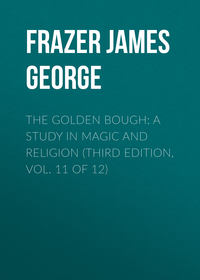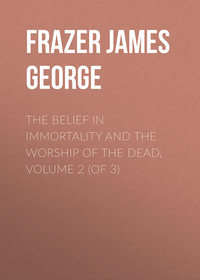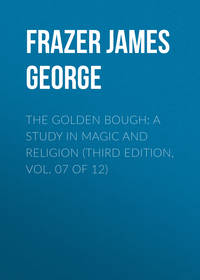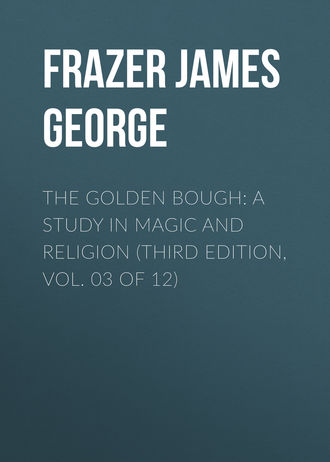 полная версия
полная версияThe Golden Bough: A Study in Magic and Religion (Third Edition, Vol. 03 of 12)
These taboos can hardly be accounted for by the intermarriage of tribes speaking different languages. Differences of language between husbands and wives. Intermixture of races speaking different languages would hardly account for the taboos on the names of relations.
It will perhaps occur to the reader that customs of this latter sort may possibly have originated in the intermarriage of tribes speaking different languages; and there are some Australian facts which seem at first sight to favour this supposition. Thus with regard to the natives of South Australia we are told that “the principal mark of distinction between the tribes is difference of language or dialect; where the tribes intermix greatly no inconvenience is experienced on this account, as every person understands, in addition to his own dialect, that of the neighbouring tribe; the consequence is that two persons commonly converse in two languages, just as an Englishman and German would hold a conversation, each person speaking his own language, but understanding that of the other as well as his own. This peculiarity will often occur in one family through intermarriages, neither party ever thinking of changing his or her dialect for that of the other. Children do not always adopt the language of the mother, but that of the tribe among whom they live.”1310 Among some tribes of western Victoria a man was actually forbidden to marry a wife who spoke the same dialect as himself; and during the preliminary visit, which each paid to the tribe of the other, neither was permitted to speak the language of the tribe which he or she was visiting. The children spoke the language of their father and might never mix it with any other. To her children the mother spoke in their father's language, but to her husband she spoke in her own, and he answered her in his; “so that all conversation is carried on between husband and wife in the same way as between an Englishman and a Frenchwoman, each speaking his or her own language. This very remarkable law explains the preservation of so many distinct dialects within so limited a space, even where there are no physical obstacles to ready and frequent communication between the tribes.”1311 So amongst the Sakais, an aboriginal race of the Malay Peninsula, a man goes to a considerable distance for a wife, generally to a tribe who speak quite a different dialect.1312 The Indian tribes of French Guiana have each their own dialect and would hardly be able to understand each other, were it not that almost every person marries a wife or a husband of a different tribe, and thus the newcomers serve as interpreters between the tribe in which they live and that in which they were born and brought up.1313 It is well known that the Carib women spoke a language which differed in some respects from that of the men, and the explanation generally given of the difference is that the women preserved the language of a race of whom the men had been exterminated and the women married by the Caribs. This explanation is not, as some seem to suppose, a mere hypothesis of the learned, devised to clear up a curious discrepancy; it was a tradition current among the Caribs themselves in the seventeenth century,1314 and as such it deserves serious attention. But there are other facts which seem to point to a different explanation.1315 Among the Carayahis, a tribe of Brazilian Indians on the Rio Grande or Araguaya River, the dialect of the women differs from that of the men. For the most part the differences are limited to the form and sound of the words; only a few words seem to be quite distinct in the two dialects. The speech of the women appears to preserve older and fuller forms than that of the men: for instance, “girl” is yadokoma in the female speech but yadôma in the male; “nail” is desika in the mouth of a woman but desia in the mouth of a man.1316 However such remarkable differences are to be explained, a little reflection will probably convince us that a mere intermixture of races speaking different tongues could scarcely account for the phenomena of language under consideration. For the reluctance to mention the names or even syllables of the names of persons connected with the speaker by marriage can hardly be separated from the reluctance evinced by so many people to utter their own names or the names of the dead or of chiefs and kings; and if the reticence as to these latter names springs mainly from superstition, we may infer that the reticence as to the former has no better foundation. That the savage's unwillingness to mention his own name is based, at least in part, on a superstitious fear of the ill use that might be made of it by his foes, whether human or spiritual, has already been shewn. It remains to examine the similar usage in regard to the names of the dead and of royal personages.
§ 3. Names of the Dead tabooed
The names of the dead are in general not mentioned by the Australian aborigines.
The custom of abstaining from all mention of the names of the dead was observed in antiquity by the Albanians of the Caucasus,1317 and at the present day it is in full force among many savage tribes. Thus we are told that one of the customs most rigidly observed and enforced amongst the Australian aborigines is never to mention the name of a deceased person, whether male or female; to name aloud one who has departed this life would be a gross violation of their most sacred prejudices, and they carefully abstain from it.1318 The chief motive for this abstinence appears to be a fear of evoking the ghost, although the natural unwillingness to revive past sorrows undoubtedly operates also to draw the veil of oblivion over the names of the dead.1319 Once Mr. Oldfield so terrified a native by shouting out the name of a deceased person, that the man fairly took to his heels and did not venture to shew himself again for several days. At their next meeting he bitterly reproached the rash white man for his indiscretion; “nor could I,” adds Mr. Oldfield, “induce him by any means to utter the awful sound of a dead man's name, for by so doing he would have placed himself in the power of the malign spirits.”1320 On another occasion, a Watchandie woman having mentioned the name of a certain man, was informed that he had long been dead. At that she became greatly excited and spat thrice to counteract the evil effect of having taken a dead man's name into her lips. This custom of spitting thrice, as Mr. Oldfield afterwards learned, was the regular charm whereby the natives freed themselves from the power of the dangerous spirits whom they had provoked by such a rash act.1321 Among the aborigines of Victoria the dead were very rarely spoken of, and then never by their names; they were referred to in a subdued voice as “the lost one” or “the poor fellow that is no more.” To speak of them by name would, it was supposed, excite the malignity of Couit-gil, the spirit of the departed, which hovers on earth for a time before it departs for ever towards the setting sun.1322 Once when a Kurnai man was spoken to about a dead friend, soon after the decease, he looked round uneasily and said, “Do not do that, he might hear you and kill me!”1323 If a Kaiabara black dies, his tribes-people never mention his name, but call him Wurponum, “the dead,” and in order to explain who it is that has died, they speak of his father, mother, brothers, and so forth.1324 Of the tribes on the Lower Murray River we are told that when a person dies “they carefully avoid mentioning his name; but if compelled to do so, they pronounce it in a very low whisper, so faint that they imagine the spirit cannot hear their voice.”1325 Amongst the tribes of Central Australia no one may utter the name of the deceased during the period of mourning, unless it is absolutely necessary to do so, and then it is only done in a whisper for fear of disturbing and annoying the man's spirit which is walking about in ghostly form. If the ghost hears his name mentioned he concludes that his kinsfolk are not mourning for him properly; if their grief were genuine they could not bear to bandy his name about. Touched to the quick by their hard-hearted indifference, the indignant ghost will come and trouble them in dreams.1326 In these tribes no woman may ever again mention the name of a dead person, but the restriction on the male sex is not so absolute, for the name may be mentioned by men of the two subclasses to which the wife's father and wife's brother of the deceased belong.1327 Among some tribes of north-western Australia a dead man's name is never mentioned after his burial and he is only spoken of as “that one”; otherwise they think that he would return and frighten them at night in camp.1328
The names of the dead are not uttered by the American Indians.
The same reluctance to utter the names of the dead appears to prevail among all the Indian tribes of America from Hudson's Bay Territory to Patagonia. Among the Iroquois, for example, the name of the deceased was never mentioned after the period of mourning had expired.1329 The same rule was rigidly observed by the Indians of California and Oregon; its transgression might be punished with a heavy fine or even with death.1330 Thus among the Karok of California we are told that “the highest crime one can commit is the pet-chi-é-ri, the mere mention of the dead relative's name. It is a deadly insult to the survivors, and can be atoned for only by the same amount of blood-money paid for wilful murder. In default of that they will have the villain's blood.”1331 Amongst the Wintun, also of California, if some one in a group of merry talkers inadvertently mentions the name of a deceased person, “straightway there falls upon all an awful silence. No words can describe the shuddering and heart-sickening terror which seizes upon them at the utterance of that fearful word.”1332 Among the Goajiros of Colombia to mention the dead before his kinsmen is a dreadful offence, which is often punished with death; for if it happen on the rancho of the deceased, in presence of his nephew or uncle, they will assuredly kill the offender on the spot if they can. But if he escapes, the penalty resolves itself into a heavy fine, usually of two or more oxen.1333 So among the Abipones of Paraguay to mention the departed by name was a serious crime, which often led to blows and bloodshed. When it was needful to refer to such an one, it was done by means of a general phrase such as “he who is no more,” eked out with particulars which served to identify the person meant.1334
Many other peoples are reluctant to mention the names of the dead. This reluctance seems to be based on a fear of the ghosts, whose attention might be attracted by the mention of their names.
A similar reluctance to mention the names of the dead is reported of peoples so widely separated from each other as the Samoyeds of Siberia and the Todas of southern India; the Mongols of Tartary and the Tuaregs of the Sahara; the Ainos of Japan and the Akamba and Nandi of central Africa; the Tinguianes of the Philippines and the inhabitants of the Nicobar Islands, of Borneo, of Madagascar, and of Tasmania.1335 In all cases, even where it is not expressly stated, the fundamental reason for this avoidance is probably the fear of the ghost. That this is the real motive with the Tuaregs of the Sahara we are positively informed. They dread the return of the dead man's spirit, and do all they can to avoid it by shifting their camp after a death, ceasing for ever to pronounce the name of the departed, and eschewing everything that might be regarded as an evocation or recall of his soul. Hence they do not, like the Arabs, designate individuals by adding to their personal names the names of their fathers; they never speak of So-and-so, son of So-and-so; they give to every man a name which will live and die with him.1336 So among some of the Victorian tribes in Australia personal names were rarely perpetuated, because the natives believed that any one who adopted the name of a deceased person would not live long;1337 probably his ghostly namesake was supposed to come and fetch him away to the spirit-land. The Yabims of German New Guinea, who believe that the spirits of the dead pass their time in the forest eating unpalatable fruits, are unwilling to mention the names of the deceased lest their ghosts should suspend their habitual occupation to come and trouble the living.1338 In Logea, one of the Samarai Archipelago, off the south-eastern end of New Guinea, no custom is observed so strictly as the one which forbids the naming of the dead in presence of their relations. To say to a person “Your fathers are dead,” is considered a direct challenge to fight; it is an insult which must be avenged either by the death of the man who pronounced these awful words, or by the death of one of his relatives or friends. The uttering of the names of the dead is, along with homicide, one of the chief causes of war in the island. When it is necessary to refer to a dead man they designate him by such a phrase as “the father of So-and-so,” or “the brother of So-and-so.”1339 Thus the fear of mentioning the names of the dead gives rise to circumlocutions of precisely the same sort as those which originate in a reluctance to name living people. Among the Klallam Indians of Washington State no person may bear the name of his deceased father, grandfather, or any other direct ancestor in the paternal line.1340 The Masai of eastern Africa are said to resort to a simple device which enables them to speak of the dead freely without risk of the inopportune appearance of the ghost. As soon as a man or woman dies, they change his or her name, and henceforth always speak of him or her by the new name, while the old name falls into oblivion, and to utter it in the presence of a kinsman of the deceased is an insult which calls for vengeance. They assume that the dead man will not know his new name, and so will not answer to it when he hears it pronounced.1341 Ghosts are notoriously dull-witted; nothing is easier than to dupe them. However, according to another and more probable account, the name of a Masai is not changed after his death; it is merely suppressed, and he or she is referred to by a descriptive phrase, such as “my brother,” “my uncle,” “my sister.” To call a dead man by his name is deemed most unlucky, and is never done except with the intention of doing harm to his surviving family, who make great lamentations on such an occasion.1342
The like fear leads people who bear the same name as the dead to change it for another.
The same fear of the ghost, which moves people to suppress his old name, naturally leads all persons who bear a similar name to exchange it for another, lest its utterance should attract the attention of the ghost, who cannot reasonably be expected to discriminate between all the different applications of the same name. Thus we are told that in the Adelaide and Encounter Bay tribes of South Australia the repugnance to mentioning the names of those who have died lately is carried so far, that persons who bear the same name as the deceased abandon it, and either adopt temporary names or are known by any others that happen to belong to them.1343 The same practice was observed by the aborigines of New South Wales,1344 and is said to be observed by the tribes of the Lower Murray River,1345 and of King George's Sound in western Australia.1346 A similar custom prevails among some of the Queensland tribes; but the prohibition to use the names of the dead is not permanent, though it may last for many years. On the Bloomfield River, when a namesake dies, the survivor is called Tanyu, a word whose meaning is unknown; or else he or she receives a name which refers to the corpse, with the syllable Wau prefixed to it. For example, he may be called Wau-batcha, with reference to the place where the man was buried; or Wau-wotchinyu (“burnt”), with reference to the cremation of the body. And if there should be several people in camp all bearing one of these allusive designations, they are distinguished from each other by the mention of the names of their mothers or other relatives, even though these last have long been dead and gone. Whenever Mr. W. E. Roth, to whom we owe this information, could obtain an explanation of the custom, the reason invariably assigned was a fear that the ghost, hearing himself called by name, might return and cause mischief.1347 In some Australian tribes the change of name thus brought about is permanent; the old name is laid aside for ever, and the man is known by his new name for the rest of his life, or at least until he is obliged to change it again for a like reason.1348 Among the North American Indians all persons, whether men or women, who bore the name of one who had just died were obliged to abandon it and to adopt other names, which was formally done at the first ceremony of mourning for the dead.1349 In some tribes to the east of the Rocky Mountains this change of name lasted only during the season of mourning,1350 but in other tribes on the Pacific Coast of North America it seems to have been permanent.1351 Amongst the Masai also, when two men of the same tribe bear the same name, and one of them dies, the survivor changes his name.1352
Sometimes all the near relations of the deceased change their names.
Sometimes by an extension of the same reasoning all the near relations of the deceased change their names, whatever they may happen to be, doubtless from a fear that the sound of the familiar names might lure back the vagrant spirit to its old home. Thus in some Victorian tribes the ordinary names of all the next of kin were disused during the period of mourning, and certain general terms, prescribed by custom, were substituted for them. To call a mourner by his own name was considered an insult to the departed, and often led to fighting and bloodshed.1353 Among Indian tribes of north-western America near relations of the deceased often change their names “under an impression that spirits will be attracted back to earth if they hear familiar names often repeated.”1354 Among the Kiowa Indians the name of the dead is never spoken in the presence of the relatives, and on the death of any member of a family all the others take new names. This custom was noted by Raleigh's colonists on Roanoke Island more than three centuries ago.1355 Among the Lengua Indians of the Gran Chaco in South America not only is a dead man's name never mentioned, but all the survivors change their names also. They say that Death has been among them and has carried off a list of the living, and that he will soon come back for more victims; hence in order to defeat his fell purpose they change their names, believing that on his return Death, though he has got them all on his list, will not be able to identify them under their new names, and will depart to pursue the search elsewhere.1356 So among the Guaycurus of the Gran Chaco, when a death had taken place, the chief used to change the names of every person in the tribe, man and woman, young and old, and it is said to have been wonderful to observe how from that moment everybody remembered his new name just as if he had borne it all his life.1357 Nicobarese mourners take new names in order to escape the unwelcome attentions of the ghost; and for the same purpose they disguise themselves by shaving their heads so that the ghost is unable to recognise them.1358 The Chukchees of Bering Strait believe that the souls of the dead turn into malignant spirits who seek to harm the living. Hence when a mother dies the name of her youngest and dearest child is changed, in order that her ghost may not know the child.1359
When the name of the deceased is that of a common object, the word is often dropped in ordinary speech and another substituted for it.
Further, when the name of the deceased happens to be that of some common object, such as an animal, or plant, or fire, or water, it is sometimes considered necessary to drop that word in ordinary speech and replace it by another. A custom of this sort, it is plain, may easily be a potent agent of change in language; for where it prevails to any considerable extent many words must constantly become obsolete and new ones spring up. And this tendency has been remarked by observers who have recorded the custom in Australia, America, and elsewhere. For example, with regard to the Australian aborigines it has been noted that “the dialects change with almost every tribe. Some tribes name their children after natural objects; and when the person so named dies, the word is never again mentioned; another word has therefore to be invented for the object after which the child was called.” The writer gives as an instance the case of a man whose name Karla signified “fire”; when Karla died, a new word for fire had to be introduced. “Hence,” adds the writer, “the language is always changing.”1360 In the Moorunde tribe the name for “teal” used to be torpool; but when a boy called Torpool died, a new name (tilquaitch) was given to the bird, and the old name dropped out altogether from the language of the tribe.1361 Sometimes, however, such substitutes for common words were only in vogue for a limited time after the death, and were then discarded in favour of the old words. Thus among the Kowraregas of the Prince of Wales' Islands and the Gudangs of Cape York in Queensland, the names of the dead are never mentioned without great reluctance, so that, for example, when a man named Us, or quartz, died, the name of the stone was changed to nattam ure, “the thing which is a namesake,” but the original word would gradually return to common use.1362 Again, a missionary, who lived among the Victorian aborigines, remarks that “it is customary among these blacks to disuse a word when a person has died whose name was the same, or even of the same sound. I find great difficulty in getting blacks to repeat such words. I believe this custom is common to all the Victorian tribes, though in course of time the word is resumed again. I have seen among the Murray blacks the dead freely spoken of when they have been dead some time.”1363 Again, in the Encounter Bay tribe of South Australia, if a man of the name of Ngnke, which means “water,” were to die, the whole tribe would be obliged to use some other word to express water for a considerable time after his decease. The writer who records this custom surmises that it may explain the presence of a number of synonyms in the language of the tribe.1364 This conjecture is confirmed by what we know of some Victorian tribes whose speech comprised a regular set of synonyms to be used instead of the common terms by all members of a tribe in times of mourning. For instance, if a man called Waa (“crow”) departed this life, during the period of mourning for him nobody might call a crow a waa; everybody had to speak of the bird as a narrapart. When a person who rejoiced in the title of Ringtail Opossum (weearn) had gone the way of all flesh, his sorrowing relations and the tribe at large were bound for a time to refer to ringtail opossums by the more sonorous name of manuungkuurt. If the community were plunged in grief for the loss of a respected female who bore the honourable name of Turkey Bustard, the proper name for turkey bustards, which was barrim barrim, went out, and tillit tilliitsh came in. And so mutatis mutandis with the names of Black Cockatoo, Grey Duck, Gigantic Crane, Kangaroo, Eagle, Dingo, and the rest.1365
This custom has transformed some of the languages of the American Indians.
A similar custom used to be constantly transforming the language of the Abipones of Paraguay, amongst whom, however, a word once abolished seems never to have been revived. New words, says the missionary Dobrizhoffer, sprang up every year like mushrooms in a night, because all words that resembled the names of the dead were abolished by proclamation and others coined in their place. The mint of words was in the hands of the old women of the tribe, and whatever term they stamped with their approval and put in circulation was immediately accepted without a murmur by high and low alike, and spread like wildfire through every camp and settlement of the tribe. You would be astonished, says the same missionary, to see how meekly the whole nation acquiesces in the decision of a withered old hag, and how completely the old familiar words fall instantly out of use and are never repeated either through force of habit or forgetfulness. In the seven years that Dobrizhoffer spent among these Indians the native word for jaguar was changed thrice, and the words for crocodile, thorn, and the slaughter of cattle underwent similar though less varied vicissitudes. As a result of this habit, the vocabularies of the missionaries teemed with erasures, old words having constantly to be struck out as obsolete and new ones inserted in their place.1366 Similarly, a peculiar feature of the Comanche language is that a portion of the vocabulary is continually changing. If, for example, a person called Eagle or Bison dies, a new name is invented for the bird or beast, because it is forbidden to mention the name of any one who is dead.1367 So amongst the Kiowa Indians all words that suggest the name of a deceased person are dropped for a term of years and other words are substituted for them. The old word may after the lapse of years be restored, but it often happens that the new one keeps its place and the original word is entirely forgotten. Old men sometimes remember as many as three different names which have been successively used for the same thing. The new word is commonly a novel combination of existing roots, or a novel use of a current word, rather than a deliberately invented term.1368


